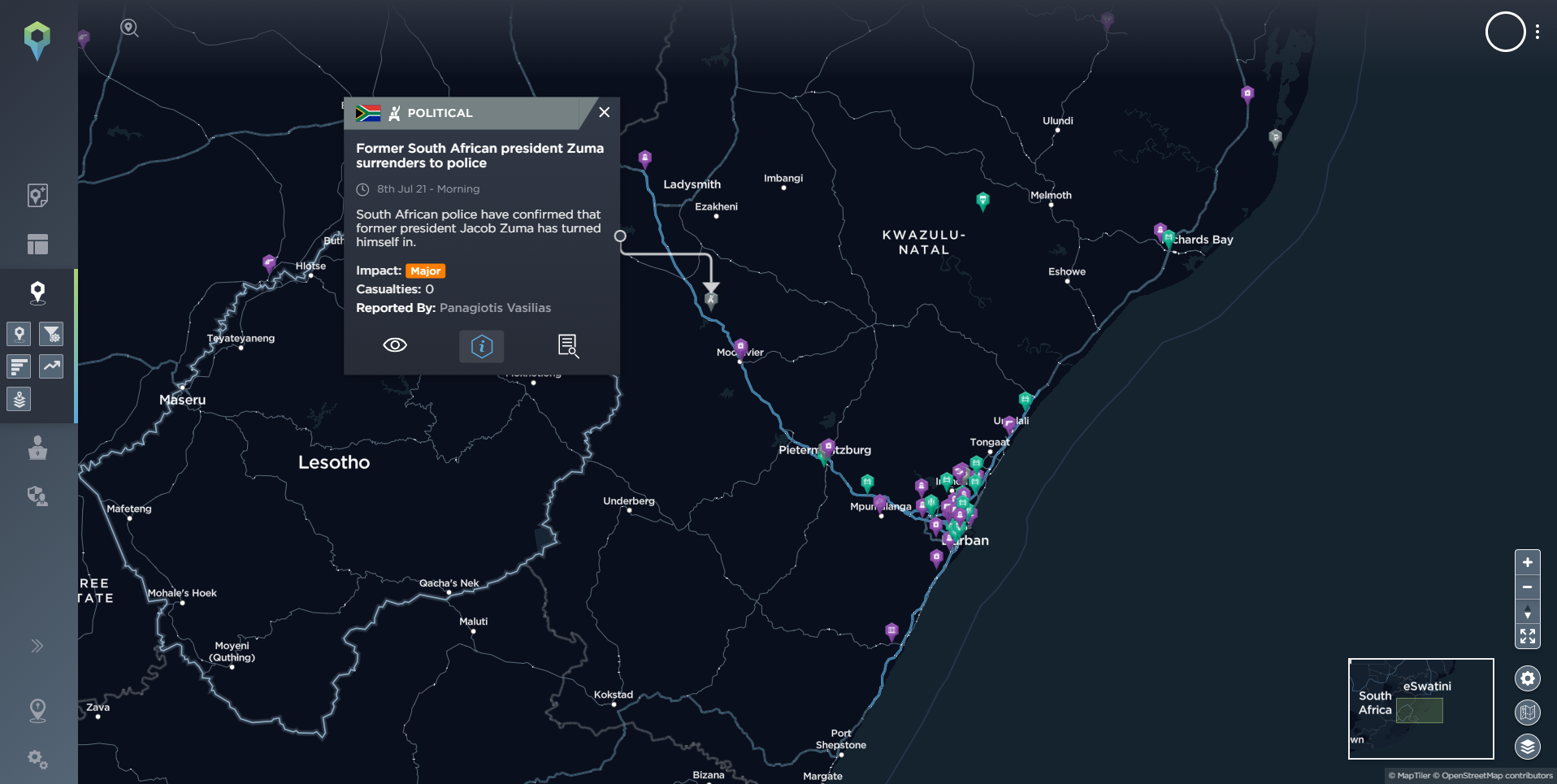What are the Implications of South Africa’s 2024 Elections?
South Africa's 2024 general election is set to take place on 29th May, amidst an ongoing energy crisis, violent crime, and high levels of unemployment. We look at the key parties, the issues facing South Africans as they head to the polls, and why political unrest is likely in the lead up to South Africa's elections.
Summary
- The ANC has lost majority support ahead of the South Africa elections, increasing the likelihood of a coalition government.
- Infrastructure and economic issues will likely impact voter loyalty, both on a national and provincial level.
- Political unrest is likely due to infrastructure issues and grievances regarding party policies.
Key parties ahead of South Africa's election
There are four main political parties within South Africa, the African National Congress (ANC), the Democratic Alliance (DA), the Economic Freedom Fighters (EFF), and the uMkhonto we Sizwe (MK). The latter was formed on the 16th of December 2023, Reconciliation Day, by former President Jacob Zuma. Since its establishment, there have been ongoing issues regarding its registration and the ability of Jacob Zuma to run for President due to his 15-month imprisonment from July 2021.
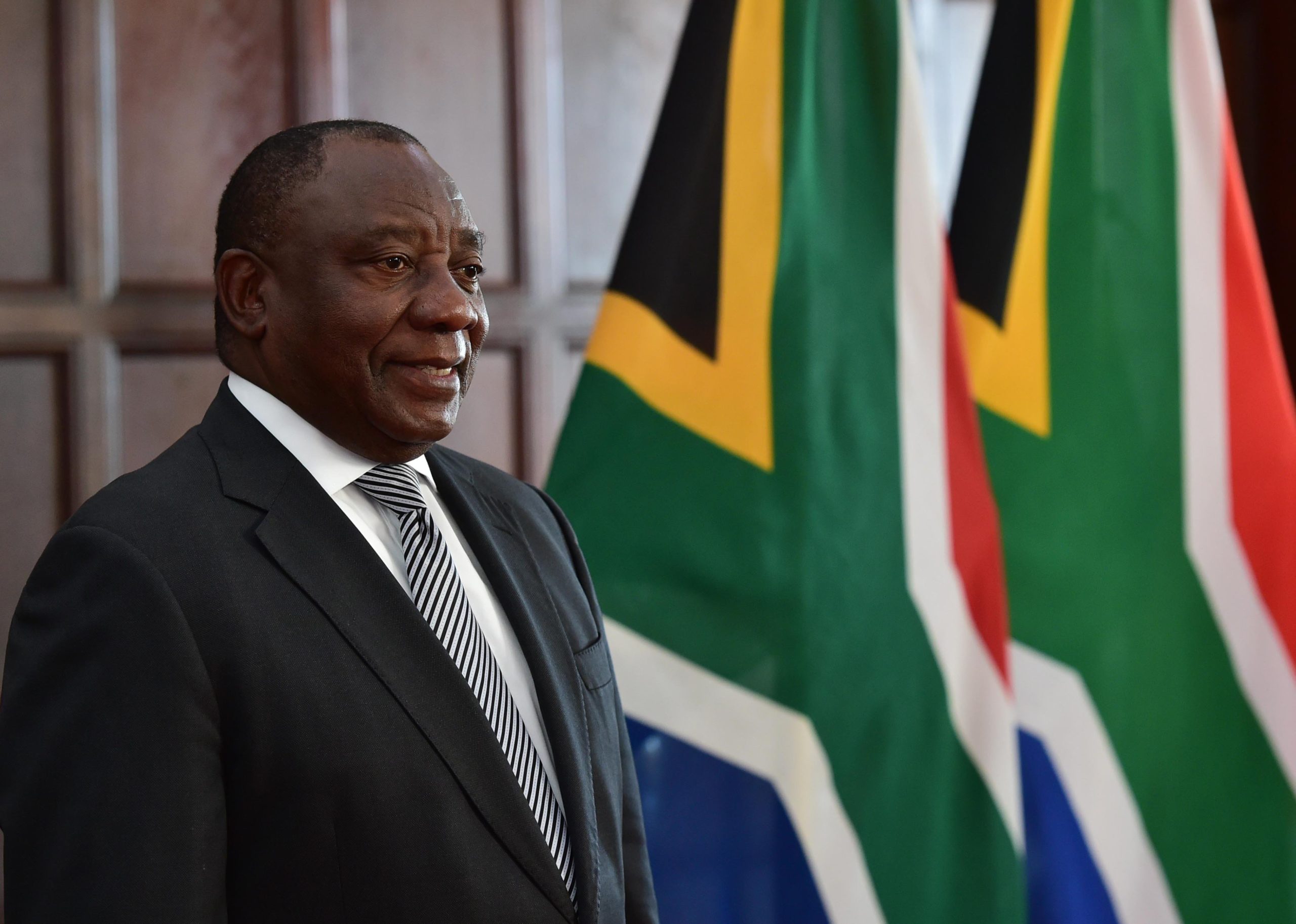
South Africa President Cyril Ramaphosa [image source: https://twitter.com/GovernmentZA/status/1222051117217042438]
African National Congress:
Support for the ANC has fallen to approximately 40% ahead of the South Africa elections. Since their victory in 1994 following the end of Apartheid, the ANC has consistently won the majority of votes and seats in the National Assembly. The decline in support suggests that the formation of a coalition between the ANC and either the EFF, MK, or the DA is likely. A coalition with the DA seems more feasible due to concerns about potential unrest and economic damage associated with the EFF. However, it is uncertain whether the DA will be willing to form a coalition with the current ruling party.
The declining support for the ANC can be attributed to ongoing feelings of despair and the deteriorating infrastructure plaguing the country. Additionally, recent corruption scandals have further eroded public trust. President Ramaphosa was embroiled in the Phala Phala (farmgate) corruption scandal for most of 2022, and more recently, former Defence Minister Nosiviwe Mapisa-Nqakula was accused of accepting $135,000 in bribes. Another contributing factor to the failing support for the ANC is the formation of the MK; they are likely to lose parts of their voter base, specifically in KwaZulu-Natal.
Democratic Alliance:
The party is currently the second most popular in the country, with approximately 19% of the vote, and they govern the Western Cape. The party has announced a seven-point “rescue plan” for the country, which includes creating 2 million new jobs, ending load-shedding and water shedding, halving the violent crime rate, diminishing corruption, assisting 6 million people to get out of poverty, ensuring healthcare for all, and tripling the number of grade four learners who can read. The party has also stated that it aims to swap BEE (Black Empowerment Movement), implemented in 2003, with the United Nations Sustainable Development Goals. The programme was implemented to address the inequalities suffered by black South African citizens following the apartheid regime.
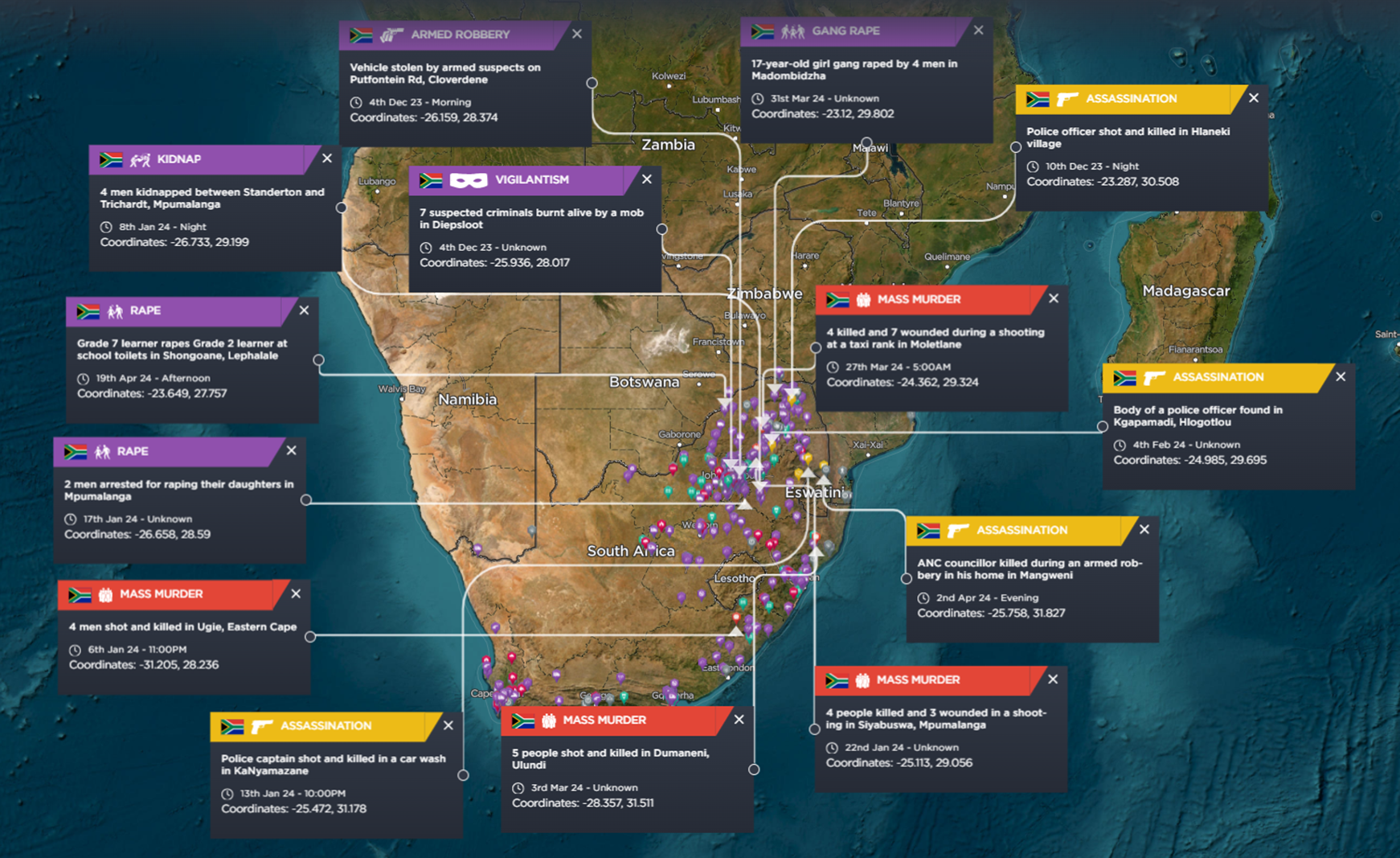
Violent crime in South Africa is commonplace; the country has the fifth highest crime rate globally [image source: Intelligence Fusion]
Economic Freedom Fighters:
The party was founded by former ANC Youth League President Julius Malema in 2013. They currently have approximately 16% of the vote. The party claims to be a Marxist-Leninist and pan-Africanist political party. There is an ongoing court case against the party leader for hate speech following a clash between parents and EFF supporters outside of a school in 2010. The EFF aims to empower the marginalized, drive economic transformation, pursue social justice and claim to have bold and progressive policies, including land expropriation and nationalization. Land ownership is a priority for the party; it favors the expropriation of white-owned land for redistribution and that all land acquired through land reform must be state-owned.
uMkhonto we Sizwe:
Originally registered by Jabulani Sibongiseni Khumalo on the 7th of September 2023, the uMkhonte we Sizwe party, or MK, is named after the paramilitary wing of the ANC, and there have been threats of legal action over the usage of the name. Former President Zuma has reportedly stated that the party’s formation was in response to the trajectory of the ANC. The party has gained popularity within the province of KwaZulu-Natal, where they currently hold 25% of the votes, ahead of the ANC, which holds 20%. The structure of the party will only be announced after the election, while no policies have been announced, with reports indicating that the party is centered around Zuma’s grievances. Zuma has accused the ANC of manufacturing the power crisis to grow certain companies within the country.
The image below shows a breakdown of voter intentions ahead of the elections, organized by the Change Starts Now party. The MK party is not included in the statistics.
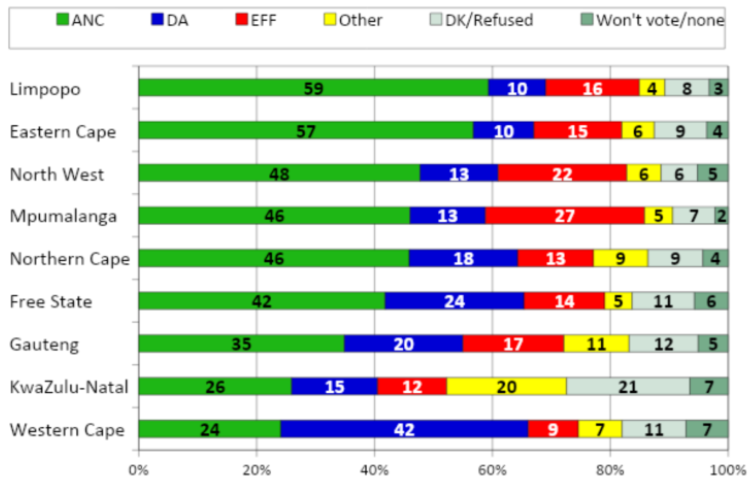
A provincial breakdown of voter intentions ahead of the 2024 South Africa elections [image source: CSN, University of Witswatersrand – https://www.wits.ac.za/news/latest-news/opinion/2024/2024-02/new-poll-shows-dramatic-decline-in-electoral-support-of-anc.html]
Key issues ahead of the South Africa elections
The country faces a multitude of ongoing issues, namely unemployment, corruption, electrical and water infrastructure degradation, and an increasing violent crime rate.
Failing infrastructure, such as Eskom and the water infrastructure, has negatively impacted the country’s GDP, which has increased by under 1% since before Covid 19. Eskom is a state-owned entity that is failing to generate the amount of power needed to sustain the country. With Eskom unable to cope with the increasing demand, rolling blackouts and load-shedding are ongoing; in 2023, more load-shedding was reported than between the years of 2008-2021 combined. Rolling blackouts, with varying levels that determine their frequency and length, are common. The increase in load-shedding has led to distrust between the people and the government, fueling load-shedding protests.
The water infrastructure, combined with increasing temperatures, is resulting in emptying dams and water outages across various parts of Gauteng and the Western Cape.
Combined with the failing infrastructure in the country are a high unemployment rate and an increase in crime rates. Unemployment currently sits at 32.1%, making it the highest in the world. In 2024, the crime index of the country is sitting at 75.4; the value has consistently fluctuated between 75 and 77 in the past ten years. South Africa is currently ranked as the highest crime index in the region and is fifth globally. Reports indicate that within the last three months of 2023, approximately 80 murders and 130 rapes were occurring daily.
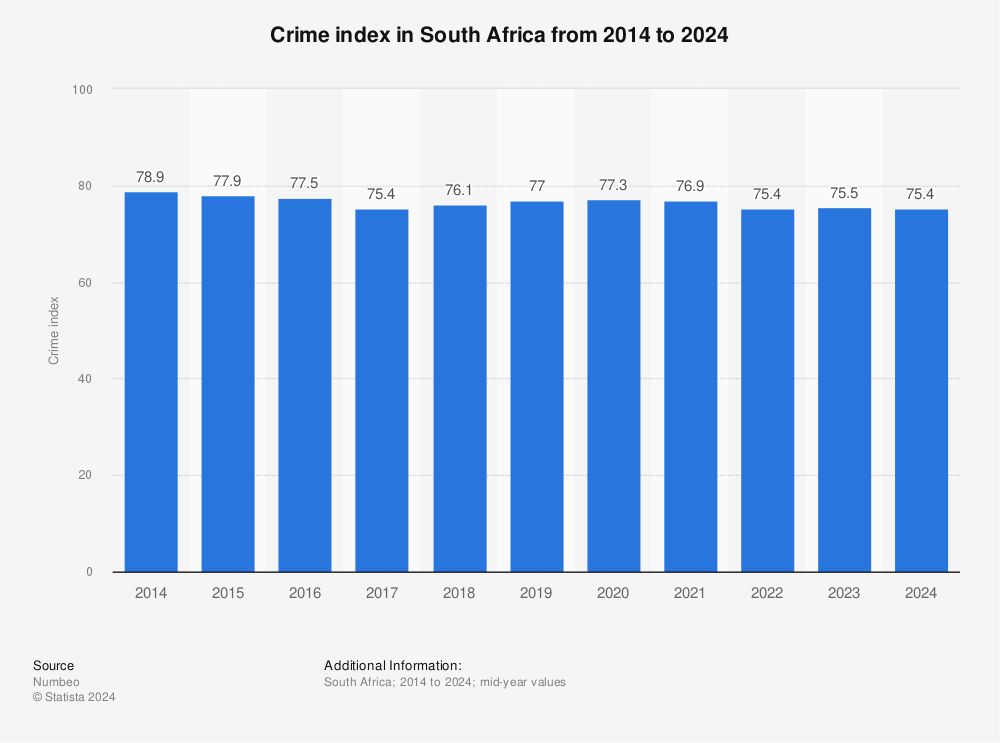
South Africa's crime index over the past ten years [image source: Statista]
Unrest is closely associated with politics in South Africa, such as the unrest experienced in July 2021 surrounding the imprisonment of Former President Jacob Zuma. The Free Zuma protests, between the 7th and 19th of July 2021, occurred throughout the country, resulting in large-scale looting, road blockades, and clashes. There was violence in KwaZulu-Natal, where residents armed themselves against the looters.
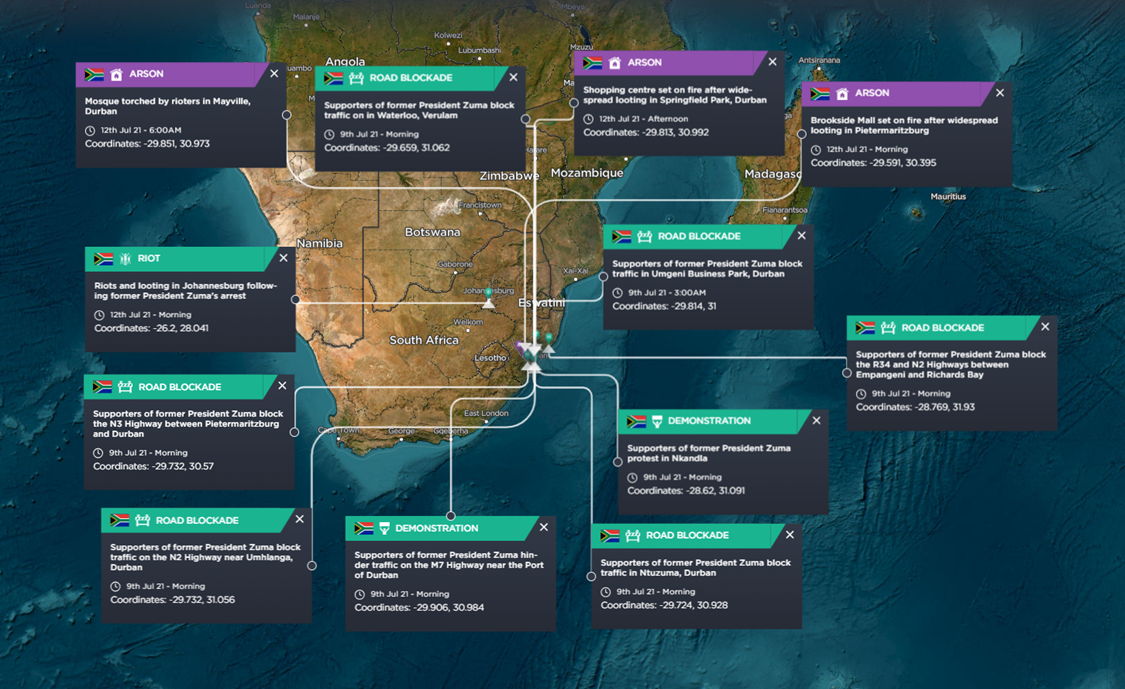
The KwaZulu-Natal region in particular erupted into violence when former President Jacob Zuma was arrested in July 2021 [image source: Intelligence Fusion]
Clashes between various youth groups, mainly the ANC and the DA, occur frequently. While violence is associated with this unrest, casualty numbers are often low, with military and police being deployed to disperse protestors.
Below is an image of some of the protests and road blockades that occurred on and around the 20th of March, 2023, when the EFF called for the resignation of President Cyril Ramaphosa.
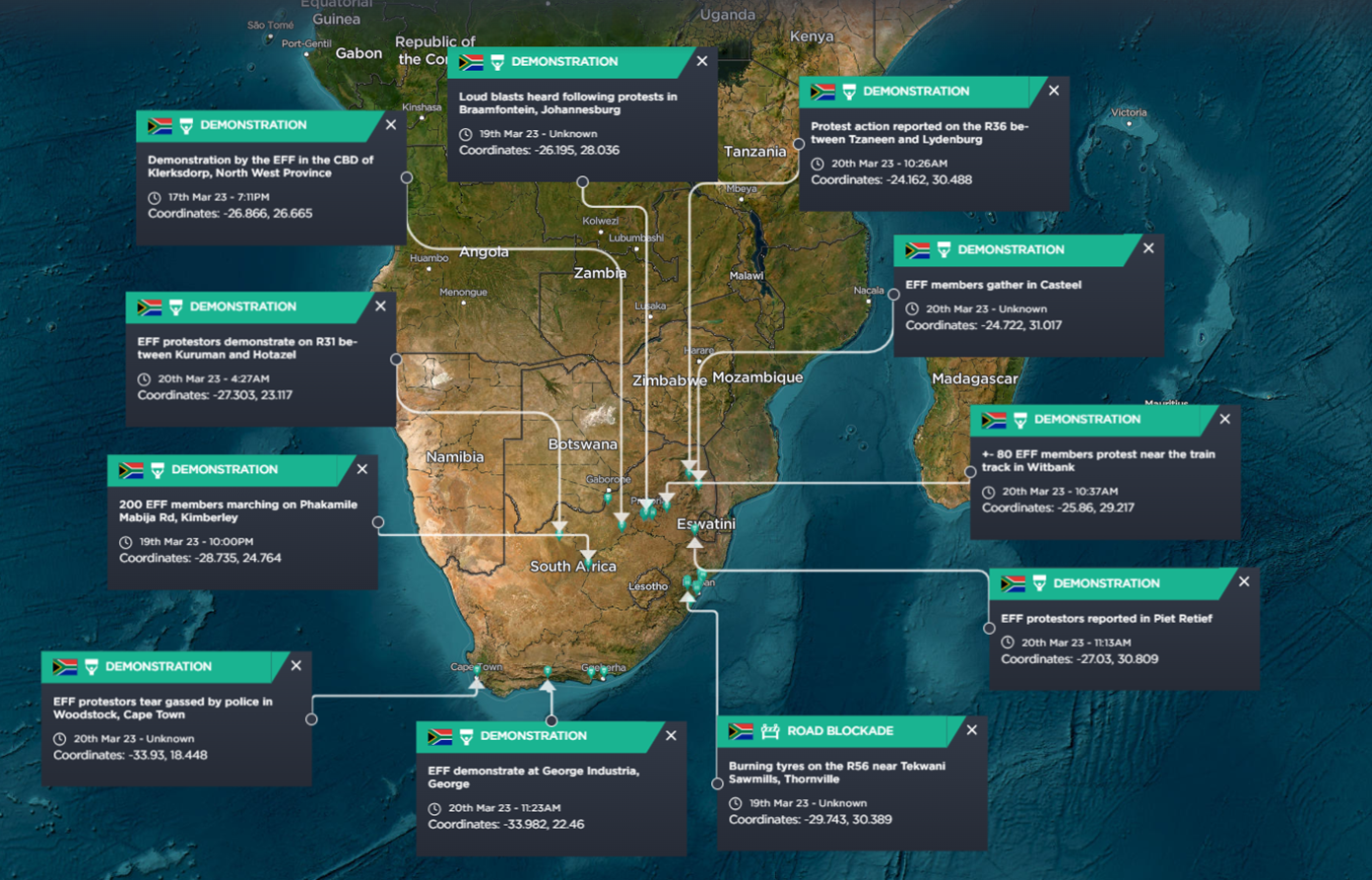
Protests and road blockades from 20th March 2023, when EFF supporters demonstrated against President Ramaphosa [image source: Intelligence Fusion]
What risks do the South Africa elections pose to business and security?
The elections present a number of risks, including election violence. These risks are likely to be sporadic acts of violence, such as looting, rioting, and vandalism, as well as political violence, and there is an increased risk of fatalities. Businesses and supply chains are likely to be impacted due to road blockades, hijackings, and organised crime (gangs). Gangs and armed groups may take advantage of the unrest and loot trucks transporting goods and minerals. Protestors are likely to disrupt ports by blocking entrances to shipping yards, preventing workers and goods from entering the premises. It has become a notable trend that during protest action, protestors are likely to burn tyres and other debris on main roads that connect metropolitan areas.
Due to the decrease in support, coalitions may form in provinces as well as on a national level, necessitating effective risk management. Based on the 2019 elections, where the ANC won Gauteng by 50.12%, a coalition within the province is not unlikely.
It appears likely that civil unrest and potentially political violence could occur in the lead up to and aftermath of South Africa’s elections. This often features road blockades, looting, and other disruption. It is therefore vital that your organisation is as prepared as possible from both an operational risk and a security standpoint. Staying ahead of the threats using threat intelligence should be a key part of your risk mitigation and security planning strategy.
Intelligence Fusion’s threat intelligence platform is relied on by security and risk teams at some of the world’s largest and most complex organisations, helping to keep their people, assets, and operations safe from harm, and minimise disruption. If you’d like to learn more about how we do this, and how we can work with you and your team, reach out via the form below, or click here.

![The image shows demonstrations that may impact businesses, assets and people [image source: Intelligence Fusion].](https://www.intelligencefusion.co.uk/wp-content/uploads/2023/03/image4.png)
